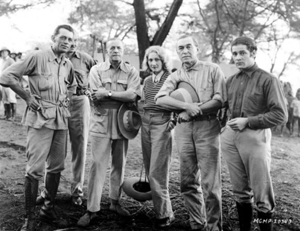William Frederick Gowers facts for kids
Quick facts for kids
Sir William Frederick Gowers
|
|
|---|---|

Sir William Frederick Gowers (second from left), poses with members of the 1931 Trader Horn movie company: director W.S. Van Dyke, Edwina Booth, Harry Carey and Duncan Renaldo
|
|
| Lieutenant Governor of Northern Nigeria | |
| In office 1921–1925 |
|
| Preceded by | Herbert Symonds Goldsmith |
| Succeeded by | Sir Herbert Richmond Palmer |
| Governor of Uganda | |
| In office 18 May 1925 – 23 Nov 1932 |
|
| Preceded by | Geoffrey Francis Archer |
| Succeeded by | Bernard Henry Bourdillon |
| Personal details | |
| Born | 31 December 1875 |
| Died | 7 October 1954 (aged 78) |
| Relations | William Gowers (neurologist) (father), Ernest Gowers (brother) |
Sir William Frederick Gowers (born December 31, 1875 – died October 7, 1954) was an important British leader. He worked for the British Empire in different parts of Africa. He is best known for being the Governor of Uganda from 1925 to 1932.
Contents
Early Life and Education
William Gowers was born in London, England, on December 31, 1875. He went to a famous school called Rugby School. After that, he studied at Trinity College, Cambridge, where he earned a degree in 1898. He loved studying ancient Greek and Roman history and languages, and he kept this interest throughout his life.
In 1899, Gowers traveled to Africa. He started working for a company called the British South Africa Company (BSA). His job was to help manage local affairs in a region called Matabeleland, which is now part of western Zimbabwe. He left this job in 1902. William Gowers also had an older brother named Ernest Gowers.
Working in Nigeria
In 1902, William Gowers joined the Colonial Service, which was like a government service for British colonies. He became a resident in Northern Nigeria. This was just two years after Nigeria became a British "Protectorate," meaning it was under British control.
Gowers saw how the British leader, Frederick Lugard, managed the Muslim areas of the region. Lugard used a method called "indirect rule." This meant the British worked with local leaders instead of taking over completely.
During the First World War (1914–1918), Gowers helped the British army. He was a political adviser during a military mission in Cameroon from 1915 to 1916. Over time, he became the Lieutenant-Governor of the Northern Province of Nigeria.
Leading Uganda
From 1925 to 1932, Gowers served as the Governor and Commander-in-Chief of the Uganda Protectorate. This meant he was the top British official in charge of Uganda.
Changes for Farmers
Soon after becoming Governor, Gowers wanted to change how farmers paid taxes. Before, farmers had to pay a tax called envujo on their crops to local African landlords. Gowers suggested that this tax should instead be paid to the British government.
He also started a program to help local farmers. The government gave them tools like shovels and fertilizer. They also promised to buy certain amounts of crops. This helped create a strong farming economy in Uganda. This program lasted from 1926 to 1931.
Impact of the Great Depression
The Great Depression, a worldwide economic crisis, made it hard to continue the farming program. Gowers tried his best to keep it going through most of 1931. He even cut funding for other things, like his own security team, and ended expensive housing for European officials. However, he eventually had to stop the program in late 1931 due to money problems.
Language and Respect for Local Leaders
Gowers understood the importance of different languages in Uganda. Committees had suggested teaching Acholi in the north, Teso in the east, and Luganda in other areas.
He also recognized the importance of Swahili, a language spoken in many parts of East Africa. Gowers believed that Swahili could become a common language if the different territories in the African Great Lakes region ever joined together.
Gowers showed great respect for the African kings in Uganda, like those of Bunyoro. He always treated them with politeness.
Healthcare Improvements
As Governor, Gowers made sure that medicine was available to the local people. He wanted to prevent them from dying from diseases that could be treated. For example, he made sure that quinine, a medicine for malaria, was widely given out.
Supporting African Civil Servants
Gowers wanted to increase the pay for African civil servants (people who worked for the government). When the colonial office in Britain would not give more money, Gowers took a bold step. He fired more than a dozen European staff members in the capital. He then used the money he saved to significantly increase the pay of all the African civil servants who worked directly under him.
Discussions on Joining Colonies
In 1926, Sir Edward Grigg, the Governor of British Kenya, held a meeting in Nairobi. They discussed the idea of joining the East African colonies more closely. Sir William Gowers supported this idea. He thought it would bring a lot more money to Uganda. However, Governor Donald Charles Cameron of Tanganyika was against it. He worried it would be unfair to Africans because part of the plan involved setting aside land in Tanganyika for European settlers, like what happened in Kenya. Gowers only agreed to the plan because it did not involve setting aside any land in Uganda for Europeans.
Later Career and Death
After his time in Uganda, Gowers continued to work in public service. He was appointed Senior Crown Agent for the Colonies from 1932 to 1938. He also served as Deputy Chairman of the Cereals Control Board from 1939 to 1940. During World War II, he was a Civil Defence Liaison Officer from 1940 to 1942.
Sir William Gowers passed away on October 7, 1954, at the age of 78.

